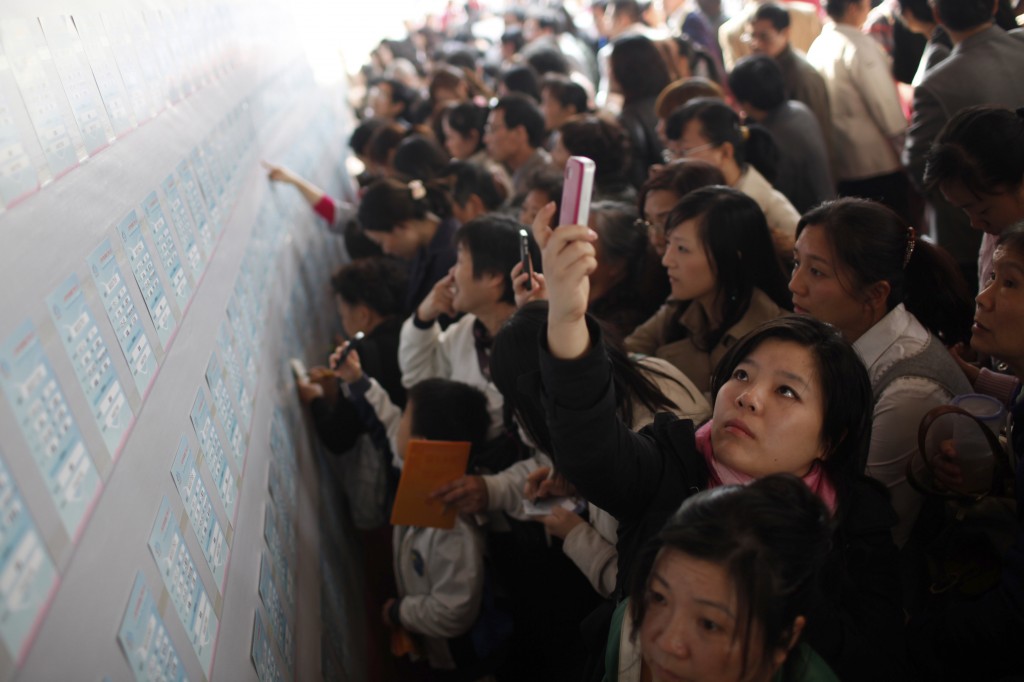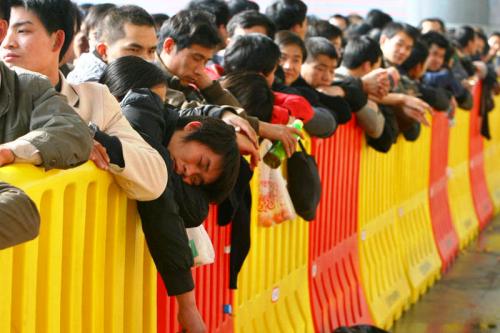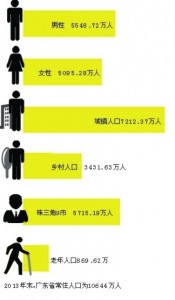An opinion poll has revealed a vast difference in opinion on topics such as farming, business, urban migration and gender between 18-30 year-olds and their parents’ generation in Guangdong’s villages.
The Canton Public Opinion Research Centre published a report based on a poll conducted from October 2012 to June 2013 revealing that the young were more averse to working on farms, more keen on running their own business, more interested in migrating to medium-sized cities than large cities, and less discriminatory on gender issues, China Daily reports.
Farming
Forty-five percent of the polled young villagers found work other than farming and only 13 percent chose to live off the land. In contrast, 44 percent of the polled older villagers, 50 to 60 years old, earned their living by farming and only 17 percent found other work.

As well as being unfashionable, becoming a farmer is less practical than it used to be, courtesy of Google Images
This is partly the result of policy, as according to the BBC, the land set aside for agriculture and the number of people working on it have shrunk as countryside continues to get converted into housing, factories and roads.
The list “Seven reasons why you don’t want to be a farmer in China,” which was published by International Business Times in August, cites environmental reasons such as pollution, soil problems, and the overuse of fertiliser.
But aside from such practical concerns, those born in the post-Mao era have reason to fear being seen as backward and uneducated if they choose to cultivate the land for a living. This could impact their marriage prospects.
In a country that once held up farmers as being paragons of simplicity and virtue, the rush to get rich that has very much been in fashion since the 1980s has seen expressions such as “你很农民” (literally “You are very farmer”) commonly used in a derogatory way.
Running a business
The poll also found that 21 percent of young villagers run their own businesses, which is 9 percentage points higher than polled older villagers.
This is the result of a phenomenon that emerged in the 1980s. As China began to embrace the goals of the global market, individuals were encouraged to take a risk and start their own business, which became known as “下海” or “plunging into the sea.”

Once China’s richest man, Huang Guangyu was sentenced to 14 years in jail in 2010 for manipulating markets, image courtesy of The Guardian
Although private sector development is seen by experts as more of an effect than a cause of China’s economic success, the Global Entrepreneurship Monitor has described China as one of the most entrepreneurial countries on earth, citing dimensions such as fear of failure and entrepreneurial intentions.
Private companies with more than eight employees began to emerge only in 1981 and were not officially sanctioned until 1988. However, according to China Macro Finance, a research firm in New York, the number of registered private businesses grew by more than 30% a year between 2000 and 2009. China has won admiration for its state capitalism. However, the country’s vast state-owned enterprises tend not to be very efficient or profitable compared to smaller, private entities that operate with little fanfare, according to The Economist.
As well as having more opportunities and incentives than their parents’ generation, the young can look up to successful entrepreneurs such as Jack Ma of Alibaba and Ma Huateng of Tencent.
Of course, being a generation whose parents grew up poor, most young businesspeople are more interested in simply making ends meet than bothering the Forbes rich list.
In 2006, the Sydney Morning Herald published an article about the dangers of getting rich in China. The article mentioned the number of wealthy Chinese who have ended up bankrupt, in jail or dead, and held up Gome entrepreneur Huang Guangyu (then China’s richest man) as being one of the few unbridled successes.
Huang was sentenced to 14 years in prison in 2010.
Urban migration
While 38 percent of the polled older villagers would love to settle down in big cities if they were able to, 50 percent of the polled young villagers prefer medium-sized cities.
The preference among young people to migrate to medium-sized cities is also partly the result of government policy. According to the Brookings Institution Press, the government has been exploring ways to stimulate growth in small and medium-sized cities for some 30 years now.
However, the Economic Observer reported this year that policy makers are split over the pace at which smaller cities should expand.
A difference in taste between the generations is also no doubt a factor. The bright lights of modern-day Guangzhou or Shenzhen may appeal to a person who grew up in an impoverished, hermetic China. But a younger person may take into account factors such as unfriendliness, pollution, traffic, and the cost of living.
Gender issues
Among the polled young villagers, 63 percent did not care whether they had a boy or a girl. However, 54 percent of the polled older villagers believed that a male heir was vitally important.
For centuries, Chinese families feared the lack of continued lineage or protection in old age if they failed to produce a male heir.
The Book of Songs, which dates from around 1000-700 BC, contains the following lines:
“When a son is born, Let him sleep on the bed, Clothe him with fine clothes, And give him jade to play… When a daughter is born, Let her sleep on the ground, Wrap her in common wrappings, And give broken tiles to play…”
China’s historical preference for baby boys ha led to some utterly horrifying stories and statistics about the abortion and abandonment of baby girls since the implementation of the one-child policy.
The younger generation now has to live with the social and economic consequences. Census data released by the National Bureau of Statistics showed that in 2011, China’s gender ratio stood at 117.78 newborn boys for every 100 baby girls, a continuous decline from 119.45 in 2009 and 117.94 in 2010.

15 men beg the same woman to marry her in this cartoon from worldpress.org
It is estimated that, by 2020, there will be 24 million more men than women at marriage age, and all the social problems that will go with it. The growing imbalance also means that forced prostitution and human trafficking has become “rampant” in some parts of the country, according to the BBC.
So, even though the income gap between the genders is widening rather than closing, it makes perfect sense that those aged under 30 see the upside to producing a daughter.
The youth of today
The lesson is, both generations have legitimate reasons for doing what they do and believing what they believe.
Can you guess which older gentleman said the following?
“Our youth now love luxury. They have bad manners, contempt for authority; they show disrespect for their elders and love chatter in place of exercise; they no longer rise when elders enter the room; they contradict their parents, chatter before company; gobble up their food and tyrannize their teachers.”
The answer is Socrates.
Conclusion – there is no such thing as a bad generation.


















